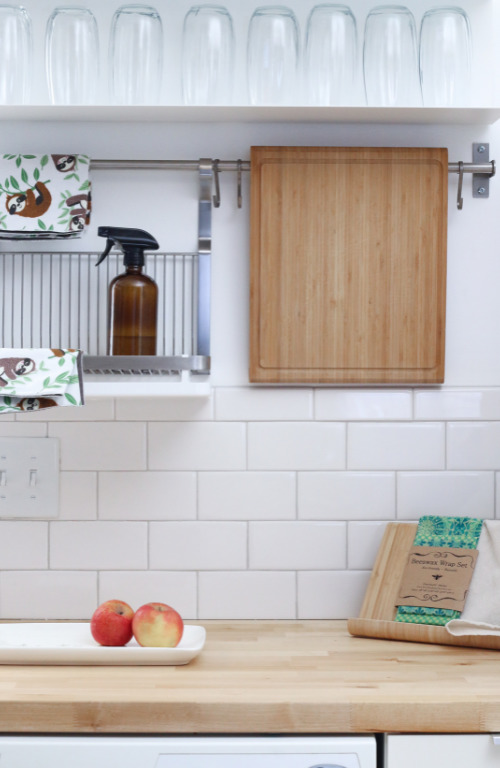Zero Waste Tips and Tricks for Minimising Food Waste at Home
Bianca Foley
Living an eco-conscious lifestyle goes beyond recycling and reducing single-use plastics. One area where we can make a significant impact is in our kitchens. Adopting zero waste practices where we can, allows us minimise food waste and contribute to a more sustainable planet. So, put on your apron and get ready to transform your kitchen into a waste-free haven with these fun and practical tips!
Plan and Prep Like a Pro: Before you head to the supermarket, take a few minutes to plan your meals for the week. Create a shopping list based on the ingredients you need, ensuring you only buy what you’ll use. Prep your fruits and vegetables ahead of time, cutting, washing, and storing them properly to extend their shelf life.
Love Your Leftovers: Turn yesterday’s dinner into today’s tasty lunch! Embrace the power of leftovers by getting creative. Reinvent them into new dishes or repurpose them as ingredients for other recipes. That leftover roasted chicken can become a flavorful addition to a salad, and those ripe bananas can be transformed into delicious banana bread.
Embrace Composting: Not all food scraps need to end up in the rubbish. Composting is a fantastic way to repurpose kitchen waste and create nutrient-rich soil for your plants. Set up a compost bin in your backyard or look for community composting initiatives near you. From vegetable peels to coffee grounds, let your food scraps work their magic! Just make sure it can seal shut to keep foxes and other animals away.

Smart Storage Solutions: Invest in airtight containers and jars to store your dry goods and leftovers. Mason jars are not only trendy but also perfect for storing bulk items like nuts, grains, and spices. By keeping your ingredients properly sealed, you’ll reduce the chances of spoilage and extend their lifespan.
Freeze It for Later: If you have surplus produce or cooked meals, freezing is your best friend. Simply portion out your excess food and store it in freezer-friendly containers. This way, you’ll always have a quick and convenient meal on hand, preventing food from going bad and reducing the temptation to order takeout.
Get Creative with Scraps: Don’t toss those vegetable peels and herb stems just yet! Repurpose them in your cooking. Veggie scraps can be used to make flavorful stocks and broths, while herb stems can infuse oils and vinegars. Get imaginative and let your kitchen scraps bring new dimensions of taste to your dishes.
Ditch Single-Use Plastics: It is #plasticfreejuly after all! One of the easiest ways to reduce waste in the kitchen is by saying goodbye to single-use plastics. Challenge yourself for one day this month to not buy anything in single use plastic and try your best not to buy vegetables that come in any wrappers. Replace plastic wrap or clingfilm with beeswax wraps, swap out disposable utensils for reusable ones, and opt for glass or stainless steel food storage containers. These sustainable alternatives are not only kinder to the environment but also add a touch of style to your kitchen.
Products you can buy now to help your Zero-Waste Journey:
- Beeswax Wraps: Tala Reusable Beeswax wraps
- Reusable Food Storage Containers: Stainless Steel Containers by Elephants & Tea, Glass Storage Containers by Zuperzozial
- Compost Bins: Eddingtons Compost Pail, OXO Good Grips Compost Bin
- Reusable Utensils: Bamboo Utensil Set by Bambaw, Stainless Steel Cutlery Set by EcoPro
- Mason Jars: Kilner Mason Jars, Ball Mason Jars
Share This Story
Related Posts

Sustainable Graduation Gifts They’ll Love
When it comes to finding the perfect gift for these eco-minded grads, you don’t look too far; here’s a guide to gifts that will not only celebrate their hard-earned achievements but also resonate with their passion for sustainability.

New PEFC Survey Reveals Consumer Unawareness of Forest-Derived Fibres in Fashion, Highlighting Need for Sustainable Practices
Discover the latest PEFC survey revealing that nearly half of consumers are unaware that their clothing contains forest-derived fibres.

The White Company Is Now B Corp Certified! Here Are My Top Homeware Picks
The White Company have now been recognised for their efforts in limiting their social and environmental impact and have been given the ultimate sustainability stamp of approval – a B Corp Certification.

7 Highlights from Global Fashion Summit
This year’s Global Fashion Summit in Copenhagen emphasises the need for a just transition and the role of influencers.
